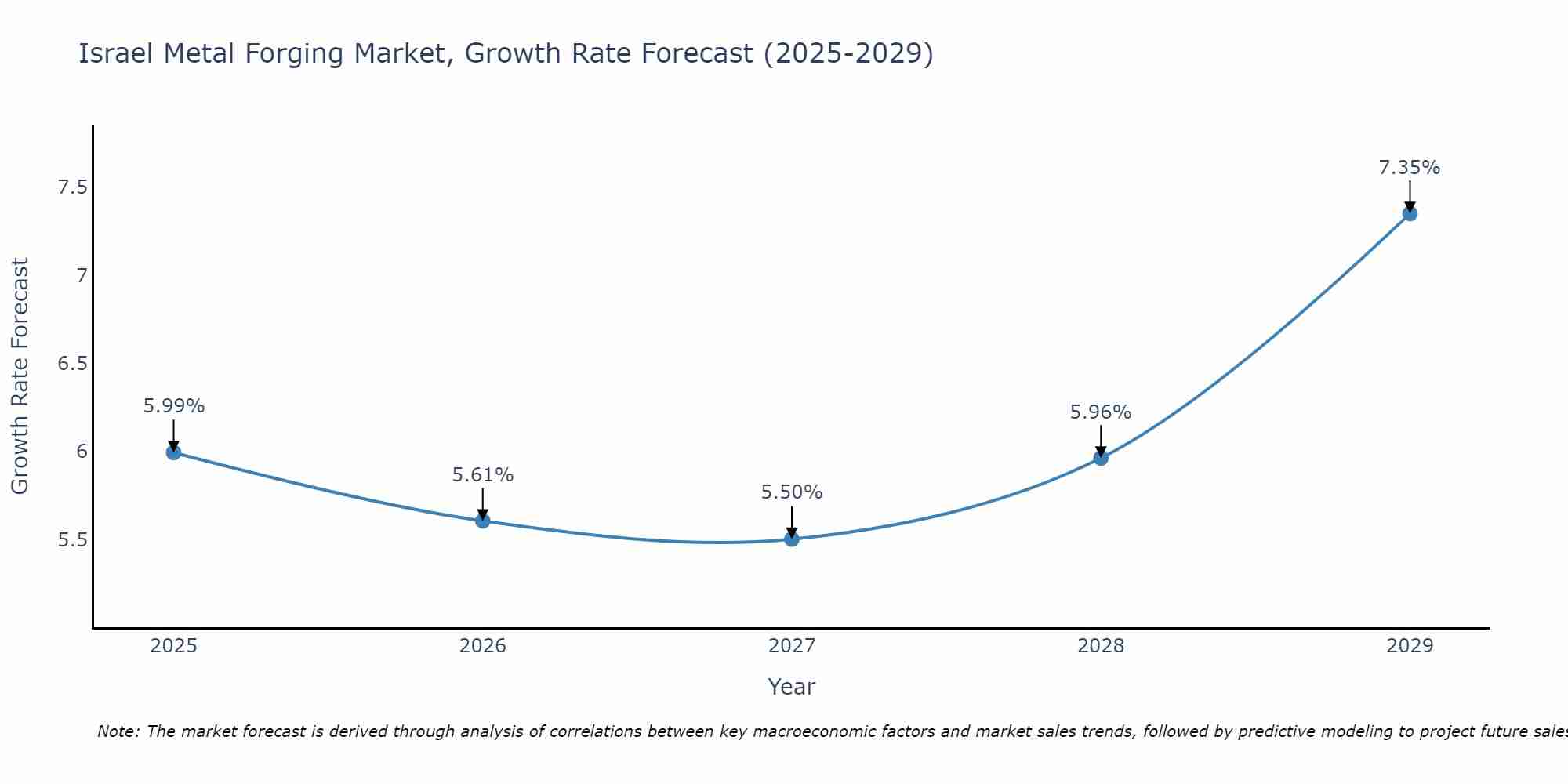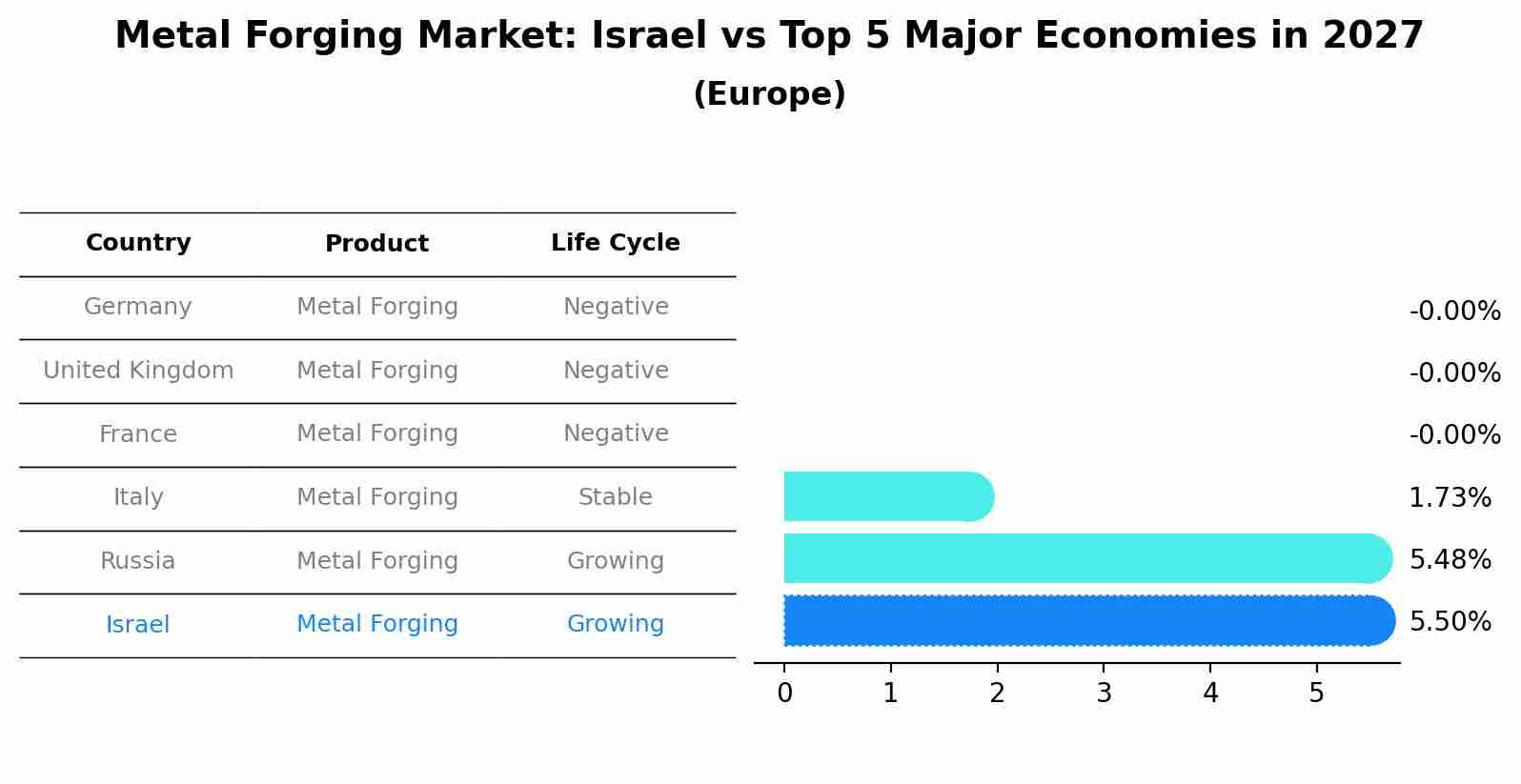Israel Metal Forging Market (2025-2031) | Industry, Value, Growth, Companies, Forecast, Outlook, Analysis, Revenue, Segmentation, Size, Trends & Share
| Product Code: ETC5376573 | Publication Date: Nov 2023 | Updated Date: Aug 2025 | Product Type: Market Research Report | |
| Publisher: 6Wresearch | Author: Ravi Bhandari | No. of Pages: 60 | No. of Figures: 30 | No. of Tables: 5 |
Israel Metal Forging Market Size Growth Rate
The Israel Metal Forging Market is projected to witness mixed growth rate patterns during 2025 to 2029. From 5.99% in 2025, the growth rate steadily ascends to 7.35% in 2029.

Metal Forging Market: Israel vs Top 5 Major Economies in 2027 (Europe)
The Metal Forging market in Israel is projected to grow at a growing growth rate of 5.50% by 2027, within the Europe region led by Germany, along with other countries like United Kingdom, France, Italy and Russia, collectively shaping a dynamic and evolving market environment driven by innovation and increasing adoption of emerging technologies.

Israel Metal Forging Market Synopsis
The metal forging market in Israel involves the manufacturing of forged metal components and parts using hot or cold forging processes to shape and strengthen metal alloys such as steel, aluminum, and titanium. Metal forging provides superior mechanical properties, grain structure refinement, and dimensional accuracy compared to other manufacturing methods, supporting critical applications in automotive, aerospace, and industrial machinery.
Drivers of the market
The Israel metal forging market is experiencing growth propelled by the expanding automotive, aerospace, and defense industries. Metal forging processes, including closed-die forging, open-die forging, and ring rolling, are essential for producing high-strength and complex-shaped components for various applications. In automotive, metal forging is used for manufacturing engine parts, drivetrain components, and suspension systems. Similarly, in aerospace and defense, metal forging plays a crucial role in producing aircraft structural components, landing gear, and missile components. Moreover, advancements in forging techniques and materials drive innovation and market expansion in Israel.
Challenges of the market
The Israel Metal Forging market faces challenges attributed to technological advancements, market demand variability, and cost pressures. Increasing demand for forged metal components with superior strength and durability imposes stringent requirements on forging processes, equipment, and materials. However, competition from alternative manufacturing methods, fluctuating raw material prices, and skilled labor shortages pose obstacles to market growth, requiring investments in automation, process optimization, and workforce development to enhance competitiveness and sustainability in the metal forging industry.
Government Policy of the market
Metal forging is a manufacturing process used to shape metal parts through controlled deformation under high pressure and temperature. In Israel, government policies aim to enhance the competitiveness of the manufacturing sector through investments in technology, infrastructure, and skills development. The market for metal forging in Israel is influenced by regulations governing product quality, safety standards, and environmental sustainability. Government support for small and medium-sized enterprises (SMEs) and export promotion initiatives contributes to the growth of the metal forging market in Israel, fostering innovation, job creation, and economic growth.
Key Highlights of the Report:
- Israel Metal Forging Market Outlook
- Market Size of Israel Metal Forging Market, 2024
- Forecast of Israel Metal Forging Market, 2031
- Historical Data and Forecast of Israel Metal Forging Revenues & Volume for the Period 2021-2031
- Israel Metal Forging Market Trend Evolution
- Israel Metal Forging Market Drivers and Challenges
- Israel Metal Forging Price Trends
- Israel Metal Forging Porter`s Five Forces
- Israel Metal Forging Industry Life Cycle
- Historical Data and Forecast of Israel Metal Forging Market Revenues & Volume By Raw Material for the Period 2021-2031
- Historical Data and Forecast of Israel Metal Forging Market Revenues & Volume By Carbon Steel for the Period 2021-2031
- Historical Data and Forecast of Israel Metal Forging Market Revenues & Volume By Alloy steel for the Period 2021-2031
- Historical Data and Forecast of Israel Metal Forging Market Revenues & Volume By Aluminum for the Period 2021-2031
- Historical Data and Forecast of Israel Metal Forging Market Revenues & Volume By Magnesium for the Period 2021-2031
- Historical Data and Forecast of Israel Metal Forging Market Revenues & Volume By Stainless Steel for the Period 2021-2031
- Historical Data and Forecast of Israel Metal Forging Market Revenues & Volume By Titanium for the Period 2021-2031
- Historical Data and Forecast of Israel Metal Forging Market Revenues & Volume By Others for the Period 2021-2031
- Historical Data and Forecast of Israel Metal Forging Market Revenues & Volume By Applications for the Period 2021-2031
- Historical Data and Forecast of Israel Metal Forging Market Revenues & Volume By Automotive for the Period 2021-2031
- Historical Data and Forecast of Israel Metal Forging Market Revenues & Volume By Aerospace for the Period 2021-2031
- Historical Data and Forecast of Israel Metal Forging Market Revenues & Volume By Oil & Gas for the Period 2021-2031
- Historical Data and Forecast of Israel Metal Forging Market Revenues & Volume By Construction for the Period 2021-2031
- Historical Data and Forecast of Israel Metal Forging Market Revenues & Volume By Agriculture for the Period 2021-2031
- Historical Data and Forecast of Israel Metal Forging Market Revenues & Volume By Others for the Period 2021-2031
- Israel Metal Forging Import Export Trade Statistics
- Market Opportunity Assessment By Raw Material
- Market Opportunity Assessment By Applications
- Israel Metal Forging Top Companies Market Share
- Israel Metal Forging Competitive Benchmarking By Technical and Operational Parameters
- Israel Metal Forging Company Profiles
- Israel Metal Forging Key Strategic Recommendations
Frequently Asked Questions About the Market Study (FAQs):
1 Executive Summary |
2 Introduction |
2.1 Key Highlights of the Report |
2.2 Report Description |
2.3 Market Scope & Segmentation |
2.4 Research Methodology |
2.5 Assumptions |
3 Israel Metal Forging Market Overview |
3.1 Israel Country Macro Economic Indicators |
3.2 Israel Metal Forging Market Revenues & Volume, 2021 & 2031F |
3.3 Israel Metal Forging Market - Industry Life Cycle |
3.4 Israel Metal Forging Market - Porter's Five Forces |
3.5 Israel Metal Forging Market Revenues & Volume Share, By Raw Material, 2021 & 2031F |
3.6 Israel Metal Forging Market Revenues & Volume Share, By Applications, 2021 & 2031F |
4 Israel Metal Forging Market Dynamics |
4.1 Impact Analysis |
4.2 Market Drivers |
4.2.1 Growing demand for lightweight and durable metal components in industries such as aerospace, automotive, and defense. |
4.2.2 Technological advancements in metal forging processes leading to increased efficiency and quality of forged products. |
4.2.3 Rising investments in infrastructure development projects driving the demand for metal forged components. |
4.3 Market Restraints |
4.3.1 Fluctuating raw material prices impacting the overall production costs of metal forging manufacturers. |
4.3.2 Intense competition from other metalworking processes like casting and machining affecting market share and pricing. |
4.3.3 Environmental regulations and sustainability concerns leading to a shift towards alternative materials and manufacturing methods. |
5 Israel Metal Forging Market Trends |
6 Israel Metal Forging Market Segmentations |
6.1 Israel Metal Forging Market, By Raw Material |
6.1.1 Overview and Analysis |
6.1.2 Israel Metal Forging Market Revenues & Volume, By Carbon Steel, 2021-2031F |
6.1.3 Israel Metal Forging Market Revenues & Volume, By Alloy steel, 2021-2031F |
6.1.4 Israel Metal Forging Market Revenues & Volume, By Aluminum, 2021-2031F |
6.1.5 Israel Metal Forging Market Revenues & Volume, By Magnesium, 2021-2031F |
6.1.6 Israel Metal Forging Market Revenues & Volume, By Stainless Steel, 2021-2031F |
6.1.7 Israel Metal Forging Market Revenues & Volume, By Titanium, 2021-2031F |
6.2 Israel Metal Forging Market, By Applications |
6.2.1 Overview and Analysis |
6.2.2 Israel Metal Forging Market Revenues & Volume, By Automotive, 2021-2031F |
6.2.3 Israel Metal Forging Market Revenues & Volume, By Aerospace, 2021-2031F |
6.2.4 Israel Metal Forging Market Revenues & Volume, By Oil & Gas, 2021-2031F |
6.2.5 Israel Metal Forging Market Revenues & Volume, By Construction, 2021-2031F |
6.2.6 Israel Metal Forging Market Revenues & Volume, By Agriculture, 2021-2031F |
6.2.7 Israel Metal Forging Market Revenues & Volume, By Others, 2021-2031F |
7 Israel Metal Forging Market Import-Export Trade Statistics |
7.1 Israel Metal Forging Market Export to Major Countries |
7.2 Israel Metal Forging Market Imports from Major Countries |
8 Israel Metal Forging Market Key Performance Indicators |
8.1 Scrap rate percentage in metal forging processes, indicating efficiency and waste reduction. |
8.2 Energy consumption per unit of output, reflecting operational sustainability and cost-effectiveness. |
8.3 Percentage of defect-free products, showcasing quality control and manufacturing excellence. |
9 Israel Metal Forging Market - Opportunity Assessment |
9.1 Israel Metal Forging Market Opportunity Assessment, By Raw Material, 2021 & 2031F |
9.2 Israel Metal Forging Market Opportunity Assessment, By Applications, 2021 & 2031F |
10 Israel Metal Forging Market - Competitive Landscape |
10.1 Israel Metal Forging Market Revenue Share, By Companies, 2024 |
10.2 Israel Metal Forging Market Competitive Benchmarking, By Operating and Technical Parameters |
11 Company Profiles |
12 Recommendations | 13 Disclaimer |
- Single User License$ 1,995
- Department License$ 2,400
- Site License$ 3,120
- Global License$ 3,795
Search
Thought Leadership and Analyst Meet
Our Clients
Related Reports
- Germany Breakfast Food Market (2026-2032) | Industry, Share, Growth, Size, Companies, Value, Analysis, Revenue, Trends, Forecast & Outlook
- Australia Briquette Market (2025-2031) | Growth, Size, Revenue, Forecast, Analysis, Trends, Value, Share, Industry & Companies
- Vietnam System Integrator Market (2025-2031) | Size, Companies, Analysis, Industry, Value, Forecast, Growth, Trends, Revenue & Share
- ASEAN and Thailand Brain Health Supplements Market (2025-2031) | Strategy, Consumer Insights, Analysis, Investment Trends, Opportunities, Growth, Size, Share, Industry, Revenue, Segments, Value, Segmentation, Supply, Forecast, Restraints, Outlook, Competition, Drivers, Trends, Demand, Pricing Analysis, Competitive, Strategic Insights, Companies, Challenges
- ASEAN Bearings Market (2025-2031) | Strategy, Consumer Insights, Analysis, Investment Trends, Opportunities, Growth, Size, Share, Industry, Revenue, Segments, Value, Segmentation, Supply, Forecast, Restraints, Outlook, Competition, Drivers, Trends, Demand, Pricing Analysis, Competitive, Strategic Insights, Companies, Challenges
- Europe Flooring Market (2025-2031) | Outlook, Share, Industry, Trends, Forecast, Companies, Revenue, Size, Analysis, Growth & Value
- Saudi Arabia Manlift Market (2025-2031) | Outlook, Size, Growth, Trends, Companies, Industry, Revenue, Value, Share, Forecast & Analysis
- Uganda Excavator, Crane, and Wheel Loaders Market (2025-2031) | Strategy, Consumer Insights, Analysis, Investment Trends, Opportunities, Growth, Size, Share, Industry, Revenue, Segments, Value, Segmentation, Supply, Forecast, Restraints, Outlook, Competition, Drivers, Trends, Demand, Pricing Analysis, Competitive, Strategic Insights, Companies, Challenges
- Rwanda Excavator, Crane, and Wheel Loaders Market (2025-2031) | Strategy, Consumer Insights, Analysis, Investment Trends, Opportunities, Growth, Size, Share, Industry, Revenue, Segments, Value, Segmentation, Supply, Forecast, Restraints, Outlook, Competition, Drivers, Trends, Demand, Pricing Analysis, Competitive, Strategic Insights, Companies, Challenges
- Kenya Excavator, Crane, and Wheel Loaders Market (2025-2031) | Strategy, Consumer Insights, Analysis, Investment Trends, Opportunities, Growth, Size, Share, Industry, Revenue, Segments, Value, Segmentation, Supply, Forecast, Restraints, Outlook, Competition, Drivers, Trends, Demand, Pricing Analysis, Competitive, Strategic Insights, Companies, Challenges
Industry Events and Analyst Meet
Whitepaper
- Middle East & Africa Commercial Security Market Click here to view more.
- Middle East & Africa Fire Safety Systems & Equipment Market Click here to view more.
- GCC Drone Market Click here to view more.
- Middle East Lighting Fixture Market Click here to view more.
- GCC Physical & Perimeter Security Market Click here to view more.
6WResearch In News
- Doha a strategic location for EV manufacturing hub: IPA Qatar
- Demand for luxury TVs surging in the GCC, says Samsung
- Empowering Growth: The Thriving Journey of Bangladesh’s Cable Industry
- Demand for luxury TVs surging in the GCC, says Samsung
- Video call with a traditional healer? Once unthinkable, it’s now common in South Africa
- Intelligent Buildings To Smooth GCC’s Path To Net Zero


















